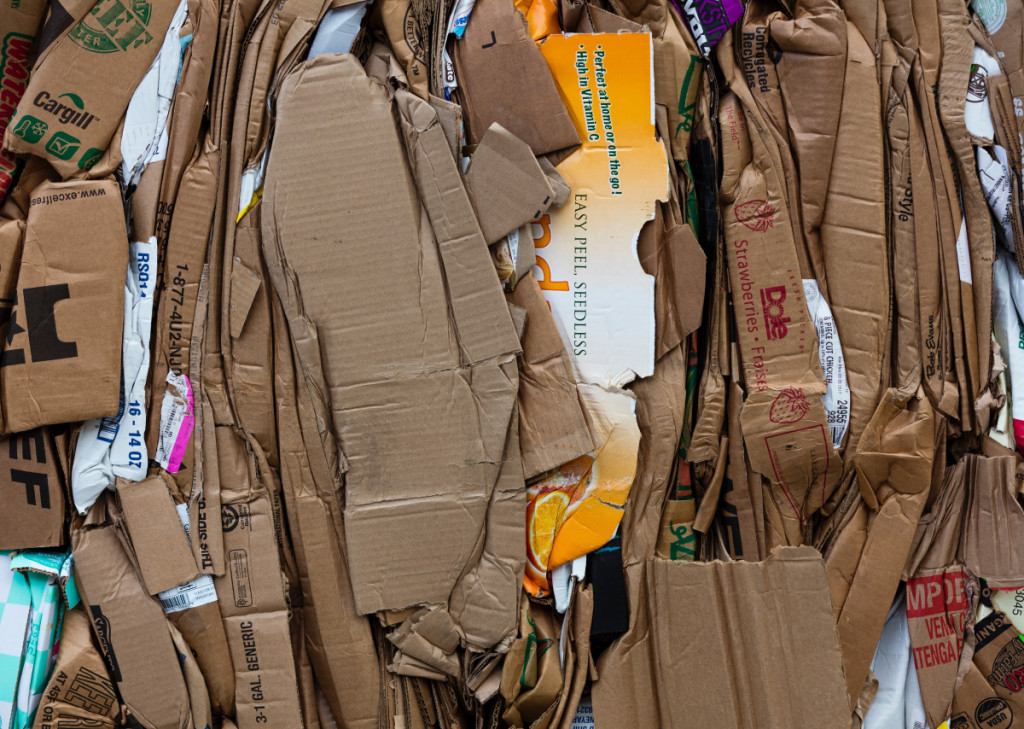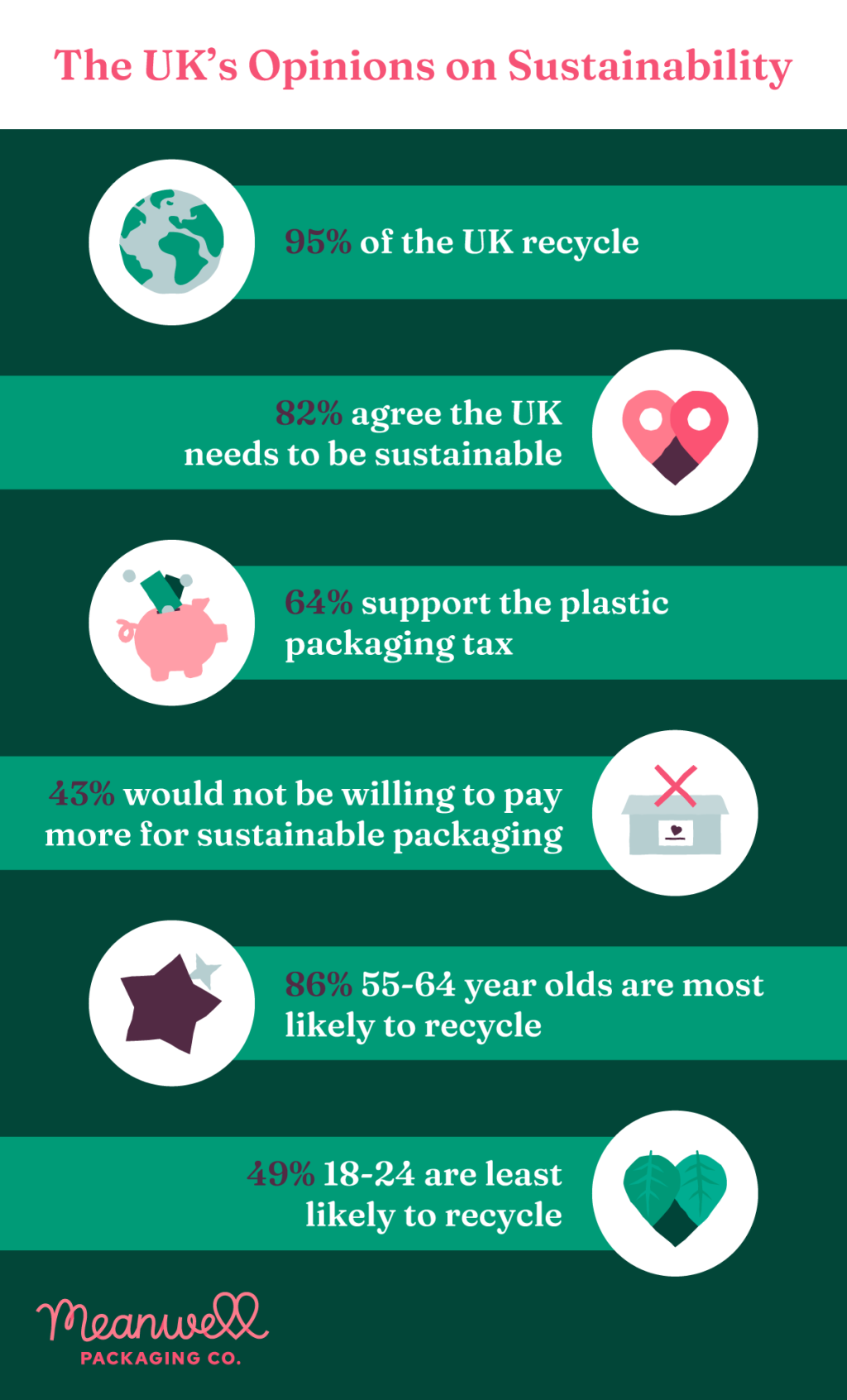Revealed: The UK’s views on sustainability
Sustainability is a hot topic right now as people become increasingly aware of the climate change risk and the damage it can have on the environment.
With momentum mounting as the climate crisis becomes more acute each day, our thoughts are also turning to the Plastic Packaging Tax, which is being introduced in the UK in April 2022. The tax aims to incentivise the use of recycled material in the production of plastic packaging. It is up to individual businesses whether they bear the cost of this tax or pass it on to their customers.
Bearing this in mind, we thought that it would be interesting to discover what the general public’s opinion is on sustainability in 2022. This is why we conducted a survey of 1,000 adults throughout the UK to find out their views and attitudes towards this complex subject.

To recycle or not to recycle?
Almost three-quarters (73%) of all respondents recycle to the best of their ability, while 22% admit that they do recycle, but could improve how they do it. For example by recycling more often, with a wider range of materials or by making more of an effort to wash items.
Additionally, only 2% responded that they don’t recycle but need to start, while 3% don’t recycle at all and have no intention of doing so. That’s a total of over 150,000 UK adults not recycling and not planning to do so.
While Gen Z is often thought to be the most environmentally aware age group, they are the least likely to recycle to the best of their ability compared to other age groups at 49% for those aged 18 to 24. Conversely, 86% of 55 to 64-year-olds, 85% of those aged 65 and over, 81% of those aged 45 to 54, 74% of people aged 35 to 44 and finally 53% of those aged 25 to 34 recycle to the best of their ability.
However, the youngest age group also admitted they could improve on how they recycle, with 44% saying so.
When it comes to the gender divide, women are more likely to recycle to the best of their ability (75%) than men (71%).
On a regional basis, the southwest is the area most likely to recycle to the best of their ability at 86%, with the East Midlands coming in a close second (85%), followed by the North East and North West tied on 80% respectively.
The bottom of the table by a significant margin at 57% in Scotland, the next lowest score being the South East at 72%. The region that is most likely to not recycle and has no intention of starting is the West Midlands (6%) followed by Yorkshire and the Humber (5%).
The cities where people are most likely to recycle as best they can are Swansea, followed by Coventry and Bristol. The top cities where people don’t recycle and have no intention of doing so are Oxford, Liverpool and Leeds.
How thorough are people’s recycling habits?

45% of people wash every item they recycle, while 35% said they rinse the majority. 11% only wash some items and 9% don’t bother at all.
When it comes to age, the over 65s are most likely to wash every item they recycle at 54%, while the 18 to 24s placed second at 51%. Bottom of the table was 25 to 34-year-olds at 32%, they were also the age bracket to not wash items for recycling full stop (14%).ompared to only 4% of 18 to 24s and at joint 8%, people aged between 45 and 54 and 55 to 64.
The location where people are by far the most likely to wash all recyclable items in Northern Ireland (70%) with the North West coming in at 53% and the South West and West Midlands at 49%.
The region least likely to wash items is the South East (39%), followed by Scotland (40%). Furthermore, the regions least likely to not wash items at all are Yorkshire and the Humber and the South West (both 13%). This was followed by Wales, Northern Ireland and the North West which are all tied on 11%. The lowest scoring regions are the East Midlands and Scotland (both 4%).
The cities most likely to wash all items ahead of recycling are Belfast (70%), Coventry (67%) and Oxford (65%). The cities least likely to rinse any items are Worcester (29%), Gloucester (27%) and Plymouth (24%).
A considered approach

When respondents were asked how often they check the packaging before putting it for recycling to ensure they’re disposing of each part correctly, 30% said they do this all the time, 40% responded often and 21% replied that they sometimes do,7% said they rarely check and 3% said never.
44% of those aged over 65 always check packing before putting it out for recycling and the next age group most likely to do so were the 18 to 24s (35%). The age group to check the least was those aged 35 to 44 (16%).
The region most likely to always check to package ahead of recycling is Northern Ireland (57%), followed by the North West (37%) and the East Midlands (33%). The area least likely to always check is Yorkshire and the Humber (23%), followed by Wales and Scotland (both 25%).
The cities most likely to answer that they always check packing before recycling are Oxford (55%), Belfast (50%) and Manchester (42%). The cities most likely to never check the packaging are Aberystwyth (17%), Worcester (14%) and Swansea (13%).
Is the UK doing enough for sustainability?
People were asked to what extent they agree or disagree with the statement that the UK needs to be more sustainable. Almost half (48%) strongly agree that more could be done, 34% somewhat agree.
The age group that most strongly agrees that the UK could be more sustainable is those aged 55 to 64 (57%), the figure for those aged 45 to 54 was 56%, while the 65 and over bracket stood at 49%. Coming in lowest at 39% were 25 to 34s then 18 to 24s at 41%.
Women feel more strongly that the UK could be more sustainable (52%) than men (45%).
The region which most strongly feels that the UK could do more to be sustainable is the North West (54%), closely followed by the East Midlands (53%) and then Wales and East Anglia (52%). The areas that feel this the least keenly are Northern Ireland (39%) and the South West (44%).
The area most likely to strongly disagree with the notion of the UK needing to do more to be sustainable is the South West (5%), while no one in the North East or Wales thought this and only 1% of people in Scotland and the West Midlands.
The cities that strongly agree more needs to be done to attain sustainability are Coventry (70%), Cambridge (60%) and Cardiff (59%). The cities which strongly disagree with this sentiment are Plymouth (12%), Wolverhampton (10%) and Portsmouth (9%).
Do people support the new UK plastic packaging tax?

From the 1st April 2022, a new tax will be introduced in the UK on plastic packaging manufactured in or imported into the UK, that does not contain at least 30% recycled plastic.
The main goal of the environmental tax is to provide a financial incentive for businesses to use recycled plastic in the manufacture of plastic packaging. But do people in the UK support the new UK plastic packaging tax?
31% of people surveyed strongly support the new tax, while one-third (33%) somewhat do. 17% of people neither support nor oppose it, while just 6% strongly or somewhat oppose it. 7% of people weren't sure either way.
The age group to most strongly support the plastic tax are the 18 to 24s (39%), closely followed by 65s and over (37%). In final place were the 35s to 44s (25%) and on joining 28% those aged 25 to 34 and 45 to 54. Most likely to strongly oppose the move were those aged 55 to 64 (10%), followed by respondents aged 35 to 44, 45 to 54 and 65 and over (all 8%). This left those aged 18 to 24 and 25 to 34 on a tied 2%.
More than one-third (36%) of men are ready to usher in the new plastic tax, compared to 26% of women. Only 6% of women and 7% of men strongly oppose the move.
The region most likely to support this tax in Northern Ireland (36%) with East Anglia at 34% and the North West, South East, Wales and West Midlands all on 33%. The areas most likely to strongly oppose the tax are the North East and Wales (both 10%), Yorkshire and the Humber (9%) and Scotland, Wales and West Midlands (all 8%).
The cities most likely to support the new tax are Wrexham (52%), Brighton and Hove (48%) and Cambridge (47%). The cities most likely to oppose it are Worcester (43%), Wolverhampton (20%) and Cardiff (18%).

Would people pay more for sustainable packaging?
Respondents of the survey were asked if they would be willing to pay more for items that have sustainable or environmentally friendly packaging. The percentages were as follows:
| Paying more for sustainable packaging | % of respondents |
| Paying 1-10% more | 29 |
| Paying 11-25% more | 12 |
| Paying 26-50% more | 10 |
| Paying 51-75% more | 5 |
| Paying 79-99% more | 2 |
The age group least willing to pay more for sustainable packaging were those aged 55 to 64 (56%) and then, perhaps understandably, those aged 65 and over and most likely to be on a pension (53%). Just 5% of people aged 18 to 24 aren't willing to pay more.
45% of women and 41% of men would not be willing or able to pay more for sustainable packaging. However, the regions least willing to pay extra for sustainable packaging are Wales (58%), East Midlands (56%) and the South West (55%).
The cities most likely to pay an extra 76% to 99% for sustainable packaging were Oxford at 18% and London placed second at 5%. Finally, Norwich and Edinburgh both come in third place at 3% for cities that are willing to pay this extra fee for sustainable packaging.
The top cities not willing to pay more for sustainable packaging are Wolverhampton (80%), Swansea (75%) and Plymouth (72%).
We hope that our research helps to provide a comprehensive overview of attitudes towards recycling and sustainability throughout the UK. We also anticipate it sheds some light on how these issues might be tackled to protect future generations.
At Meanwell Packaging, we make it our mission to create sustainable packaging which doesn’t have to cost the earth. And if it can go even a tiny way towards helping to save our planet, then that's a huge bonus.
Photo credits (all unsplash):

